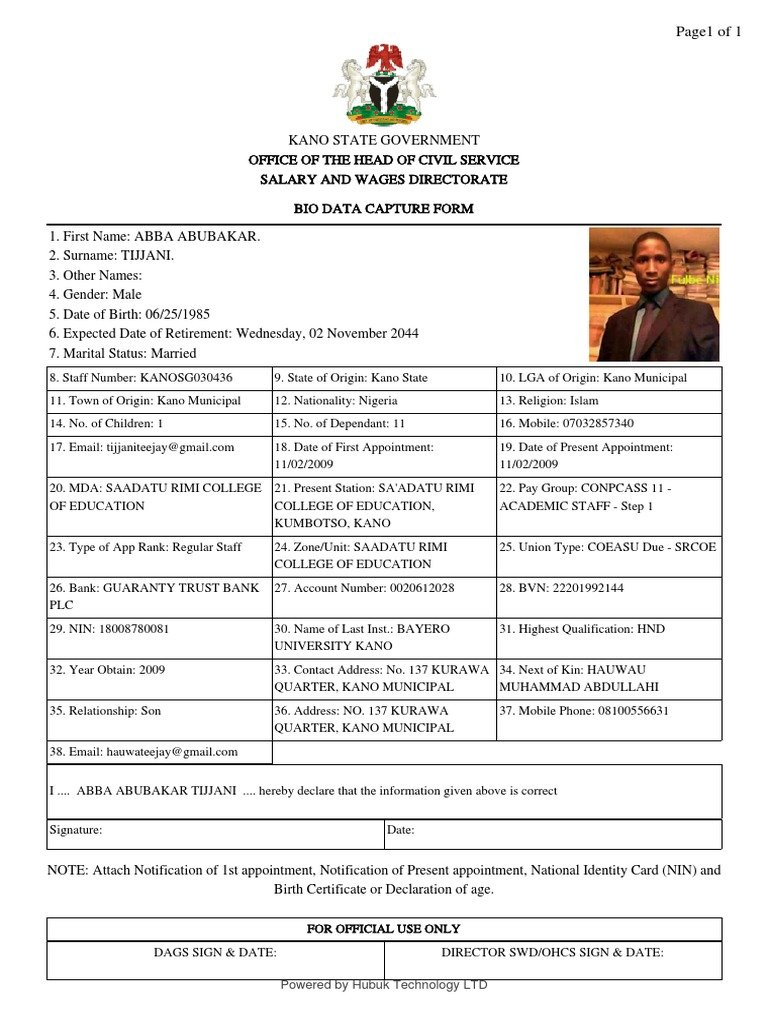Kano salary and wages vary depending on the industry and sector. Understanding the factors influencing pay in Kano is crucial for employees and employers alike. This article delves into the intricacies of Kano salary and wages, offering insights and guidance for navigating the local employment landscape. From entry-level positions to executive roles, discover the nuances that shape compensation in Kano. Stay informed and empowered in your career journey with a comprehensive look at salary trends in Kano.
Exploring Kano Salary and Wages: What You Need to Know
Welcome to our detailed guide on Kano salary and wages! Whether you’re a curious student, a future employee, or just someone interested in understanding how salaries work in Kano, this article is for you. We’ll delve into various aspects of salaries and wages in Kano state, Nigeria, and provide you with valuable insights to help you navigate the world of earning a living in this vibrant region.
The Basics of Salaries and Wages
Before we dive deep into Kano-specific details, let’s first understand what salaries and wages actually mean. Salaries and wages refer to the money that employees receive in exchange for the work they do. In simple terms, it’s how people get paid for their jobs. In Kano, like in many other places around the world, salaries and wages play a crucial role in people’s lives, determining their standard of living and financial well-being.
Salaries vs. Wages
While the terms “salary” and “wage” are often used interchangeably, there is a slight difference between the two. A salary is typically a fixed amount of money paid to an employee on a monthly or annual basis, regardless of the number of hours worked. On the other hand, wages are usually paid on an hourly basis, meaning that employees are compensated based on the hours they work.
Factors Influencing Salaries and Wages in Kano
Several factors influence the salaries and wages in Kano. Understanding these factors can give you insights into why people in Kano are paid the way they are. Let’s take a closer look at some of the key factors:
Economic Conditions
The economic conditions in Kano play a significant role in determining salaries and wages. If the economy is strong and growing, it is likely that salaries will also see an upward trend. However, during economic downturns, salaries may stagnate or even decrease due to various reasons such as reduced business activities and layoffs.
Industry and Job Sector
Another crucial factor is the industry in which a person works. Different industries pay differently based on their financial performance, demand for skills, and overall market trends. For example, the agricultural sector in Kano may have different salary levels compared to the manufacturing sector.
Education and Experience
Education and experience also play a vital role in determining salaries and wages. Generally, individuals with higher levels of education and more experience in their field are likely to command higher salaries compared to those with lower qualifications or less experience.
Understanding the Kano Salary Structure
Now that we have a grasp of the basics, let’s focus on understanding the salary structure in Kano. The salary structure refers to how salaries are determined and paid in the region. In Kano, like in many other places, there are various components that make up the salary structure. Let’s explore some of these components:
Basic Salary
The basic salary is the core component of an employee’s salary package. It is the fixed amount that an employee receives before any bonuses, overtime pay, or deductions are added or subtracted. The basic salary is usually determined based on factors such as the job role, qualifications, and industry standards.
Allowances
Allowances are additional payments made to employees on top of their basic salary. These allowances can include house rent allowances, transport allowances, and other benefits that are provided to employees to cover specific expenses or improve their overall compensation package.
Bonuses and Incentives
Bonuses and incentives are extra payments that employees receive based on their performance, the company’s profitability, or other criteria. These additional payments can motivate employees to work harder and achieve specific targets set by the organization.
Comparing Kano Salaries with Other Regions
It’s essential to compare Kano salaries with those in other regions to get a broader perspective on how compensation varies across different areas. While Kano may have its unique salary structure, it’s interesting to see how it stacks up against other regions in Nigeria or even globally.
Research shows that salaries in Kano are competitive within the Nigerian context, with variations based on factors such as job role, industry, and company size. By understanding how Kano’s salaries compare with those in other regions, employees can make informed decisions about their careers and potential earning opportunities.
Tips for Negotiating Your Salary in Kano
Whether you’re starting a new job or looking to advance in your current role, negotiating your salary is an essential skill to master. Here are some tips to help you navigate the salary negotiation process in Kano:
Do Your Research
Before entering into salary negotiations, research salary benchmarks for your industry and job role in Kano. Knowing what the standard pay ranges are can help you make a compelling case for why you deserve a certain salary level.
Sell Your Skills and Experience
During negotiations, emphasize your skills, qualifications, and experience that make you a valuable asset to the company. Highlighting your achievements and showcasing how you can contribute to the organization’s success can strengthen your position in negotiations.
Be Confident and Flexible
Approach salary negotiations with confidence while also being open to compromises. It’s essential to communicate your desired salary range clearly but also be willing to consider other benefits or incentives that the company may offer in place of a higher salary.
In conclusion, understanding the dynamics of salaries and wages in Kano is essential for both employees and employers operating in the region. By exploring the various factors influencing salaries, the salary structure in Kano, and tips for negotiating salaries, individuals can make informed decisions about their careers and financial well-being. Remember, while salaries and wages are crucial aspects of earning a living, other factors such as job satisfaction, work-life balance, and personal growth also play significant roles in overall career fulfillment. We hope this in-depth guide has provided you with valuable insights into the world of Kano salary and wages. Happy earning!
Kano Govt Slashes Salaries Of Civil Servants; Reverts To 18k Minimum Wage
Frequently Asked Questions
What is the average salary in Kano state?
The average salary in Kano state varies depending on the sector and job type. On average, professionals in Kano earn salaries ranging from X to Y Naira per month.
Are there specific minimum wage laws in Kano state?
Yes, the Kano state government has set a minimum wage that employers must adhere to. This minimum wage is revised periodically to reflect economic changes and ensure fair compensation for workers.
How often are salaries typically paid in Kano state?
In Kano state, salaries are usually paid on a monthly basis. Most organizations and businesses follow a monthly payment schedule to compensate their employees for their work.
Final Thoughts
In conclusion, Kano salary and wages play a crucial role in the economic landscape of the region. Understanding the patterns and trends in compensation levels is essential for businesses and employees alike. By analyzing data and staying informed, stakeholders can make well-informed decisions to ensure fair and competitive pay structures in Kano. Ultimately, prioritizing fair wages is key to fostering a thriving workforce and sustainable economic growth in the region.



